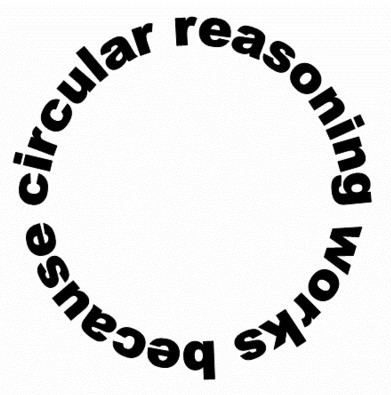As Russell aptly pointed out, this isn't philosophy; it's sophistry. As you just conceded, the apologist begins from the assumption that his position is infallible, that he cannot be wrong. He then offers arguments in support of that position, but he must never reconsider the position itself, even if the arguments are shown to be inadequate or the preponderance of evidence turns against his position. I will go into this further when I respond to your other comment this evening.
Is that supposed to be an argument for sophistry? Do you know what sophistry is?
And you accused me of being vague?

Could you elaborate on this? How does faith lead to an encounter with God?
This is also vague. What do you mean that God can't be fallible? We aren't talking about whether God is or isn't fallible, but whether the apologist can admit to the possibility of being wrong about his theological commitments. You appear to want me to assume theism from the outset.
Rather, I want you to assume that the theist assumes theism. You seem incapable of putting yourself in his shoes. Then you claim there are problems with his intentions (e.g. unphilosophical, sophistic, etc.). Yet you are just equivocating between his intention and your beliefs.
I find it humorous that in the same post in which you accuse me of "wishy-washy vagueness," you post something like this. How did the apologist determine that the issue was "settled by God" and how does this encourage the greatest honesty possible?
Do you understand what revelation is? Do you understand what faith purports to be? Did I vastly overestimate you?
Consider apologists of other religions who likewise believe that the issue has been "settled by God" in their favour. They refuse to concede that they could be wrong about their theological commitments just as strongly as you refuse to concede that you could be wrong about yours. Is this representative of the "greatest possible honesty"?
Yes, it would apply to other religions as well (if in fact they had a concept of faith such as the Christian religion). Yet you are, characteristically, avoiding the argument I gave. This is the philosophy forum, giving and critiquing arguments is advised.

First, by way of clarification, atheism is not a worldview.
Sure it is.
Second, I admit that I could be wrong on the question of theism. Going from atheism to theism, if there is good reason to do so, would not be a dramatic about-turn, IMO. I don't hold on to atheism religiously; it's an outcome of my assessment of religious claims, not a dogma that I must unquestioningly uphold regardless of what inquiry may bring to bear.
So says everyone.
Then in what sense is apologetics philosophy?
In what sense isn't it?
On the contrary, that is precisely the point! If one's theological commitments were not reached by reason and are not amenable to reason, then in what sense are they reasonable?
See, I thought we were talking about apologetic arguments, not theological commitments. Certainly I could answer your question, but you're fading into your characteristic anti-theism again (which is off topic and not allowed on CF).
In the OP, to keep matters simple, I used the definition given by the forum's
Statement of Purpose, which defines philosophy as a "critical examination of the rational grounds of our most fundamental beliefs and logical analysis of the basic concepts employed in the expression of such beliefs" (Concise Encyclopedia). My reasons for thinking that apologetics doesn't qualify were articulated in the OP and those follow-up posts.
Apparently they weren't articulated very well. You still haven't provided anything approximating a clear argument as to why apologetics is unphilosophical. Mostly I think any "arguments" you've given are fallacious, and I've addressed most of them. Yet you don't propose them with sufficient precision to even risk soundness or unsoundness. Vagueness and ambiguity abounds.
In its most pernicious form, faith exhibits resistance to arguments and evidence that contraindicate a presupposed conclusion.
What does this have to do with apologetics, or the arguments apologists make?
As a way of immunising beliefs from criticism, faith plays into our biases and ensures that errors in thinking, if there are any, are much more difficult to detect. I think anyone genuinely interested in knowing whether something is true should at least be worried by this.
Yes, yes, we know. Faith is irrational, believers are credulous, etc, etc. If only you could supply arguments. If only you tried rationality instead of willpower.
If you aren't able to provide a clear argument for why you think apologists are unphilosophical, I see no reason to continue to this exchange.
An apologist is someone who aims to rebut arguments against the faith. Why is the apologist unphilosophical?
(*Waits for thread to be shut down because it has transgressed into General Apologetics, which was essentially the original intention anyway*)


